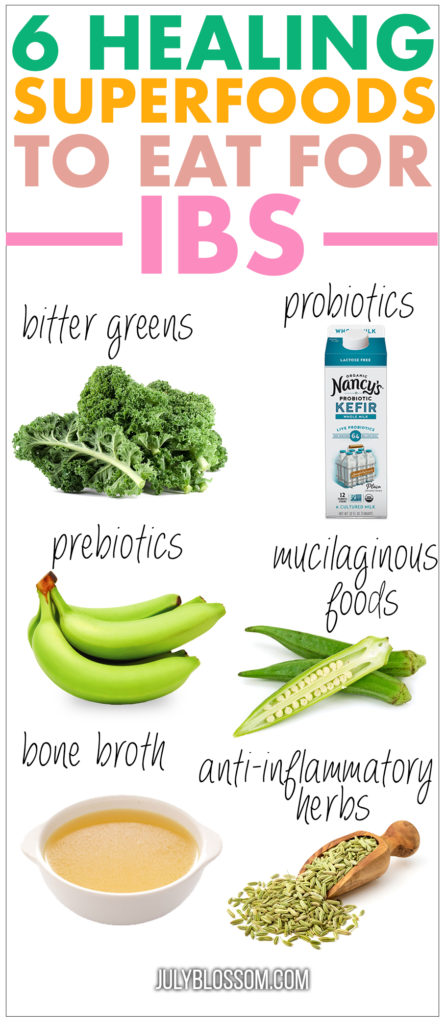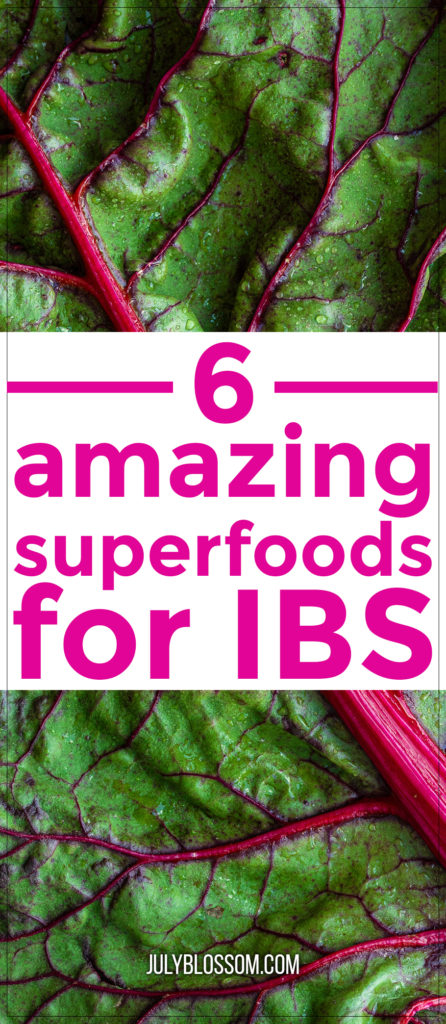I’ve put together a small list of amazing superfoods for IBS that help improve symptoms drastically. These foods are not only safe for IBS but they are also mighty healing for your gut.
Did you Know these Superfoods for IBS?

1. Bitter Greens
Bitter greens are leafy greens that have a bitter taste. You know them – arugula, collard, dandelion, kale, mustard greens, radicchio, spinach and watercress, among others.
Research shows that consuming cruciferous veggies including bitter greens sustain gut health by providing prebiotics that basically fuel the good bacteria found in the gut.
This helps increases gut microbiome, which in turn aids in proper digestion and supports a healthy gastrointestinal tract.
2. Bone Broth
Cooking roasted chicken, beef or goat bones in water with your favorite seasonings and veggies creates an elixir for fixing beat-up digestive systems.
Bone broth is incredibly nutrient-dense – it is full of amino acids, collagen, calcium, magnesium, phosphorous, gelatin, glucosamine and more.
Drinking a cup of warm broth every single day helps seal and repair leaky and sensitive guts due to its collagen and protein content.
It also helps fight food sensitivities such as gluten and diary, boosts the immune system and promotes the growth and wellbeing of the good microbes in our guts.
3. Probiotics
As someone with IBS, you’ve probably already heard about probiotics and how helpful they are for improving the functioning of the GI tract.
Probiotics are basically good bacteria that makes up our natural gut microbiome. If this complex system of bacteria is disrupted, your gut health with dwindle. You’ll be prone to indigestion, gas, bloating, constipation, diarrhea and abdominal pain.
Eating probiotics every day, whether it’s in supplement form, or having a glass of kefir, is very crucial in healing and regulating the gut. In fact, probiotics even boost mood and reduce depression because flourishing gut microbiome leads to better mental health. Research shows that the gut is actually directly connected to the brain, in fact it’s even called the ‘second brain’.
Take probiotics daily to help fix your gut and reduce IBS symptoms!
4. Prebiotics
Many people have heard about probiotics but what about prebiotics? Now simply put, prebiotics are the ‘food’ of probiotics. Remember probiotics are good bacteria. So prebiotics fuel probiotics.
Introducing prebiotics into your diet helps repopulate gut bacteria and enables it to thrive.
Examples of prebiotic foods include apples, asparagus, bananas (especially unripe green bananas which are cooked by steaming or in a stew), barley, burdock root, chicory root, cocoa, dandelion greens, flaxseeds, garlic, leeks, onions, oats and others.
5. Mucilaginous Foods
Okay, now this food group may sound rather new! But it’s foods we already know of, folks! Think foods such as chia seeds, okra, flaxseeds, aloe vera – what do they have in common? That’s right they have a gelatinous, gel-like consistency!
This gel-like compound in mucilaginous foods is called mucilage, hence the complex name. When consumed, these foods expand in the stomach, absorbing excess water. This kind of phenomenon is very useful for those with gut issues!
It helps clean up the gut and intestines and flush out toxins and build-up of wastes.
So, if you are suffering with IBS-Constipation, bloating, foul flatulence and gas, consume mucilaginous foods, which are also called nature’s laxatives, btw!
Try chia seed pudding, aloe vera juice, flaxseed as an egg replacer and okra stir-fries.
6. Anti-inflammatory Herbs
Did someone say anti-inflammatory? Because that’s exactly what we need when dealing with IBS symptoms. Increased inflammation in the gut can worsen IBS symptoms! Here are some anti-inflammatory herbs for IBS:
- Fennel seeds – I feel that fennel is the top herb when it comes to promoting digestion. In some parts of the world, people actually chew these seeds after a meal because they freshen up breath and also aid in digestion. They are sweet when chewed but you can also steep it in hot water and sip it up after a meal. Doing so also reduces and prevents gas and bloating!
- Caraway seeds – Caraway is another amazing herb for the digestive system. It helps with flatulence, bloating, gas, stomach cramps and nausea. It also prevents fermentation in the stomach and helps expel excess gas from the bowels.
- Ginger – One of my favorite herbs is ginger! It is spectacular for kickstarting digestion because it is warming which helps increases digestive ‘fire’ and boost nutrient-absorption. Ginger also stimulates the bowels and relieves constipation. It maintains healthy cells in the gut lining and aids the growth of good bacteria in the gut. Enjoying ginger tea is my go-to ways of consuming this invigorating herb.
- Peppermint – I’ve praised peppermint for IBS before – and I’m doing it again. Peppermint is the ultimate remedy for many people in subduing stomach cramps, bloating, gas, diarrhea and other IBS worries. It has a soothing effect on the digestive system, which relaxes the smooth muscles of the GI tract and reduces cramping. It’s popularly consumed as peppermint tea.
Other helpful herbs for IBS include:
- Chamomile
- Allspice
- Dill
- Turmeric
- Cinnamon
- Rosemary

Let me know in the comments below if you have tried any other superfoods for IBS!
Leave a Reply